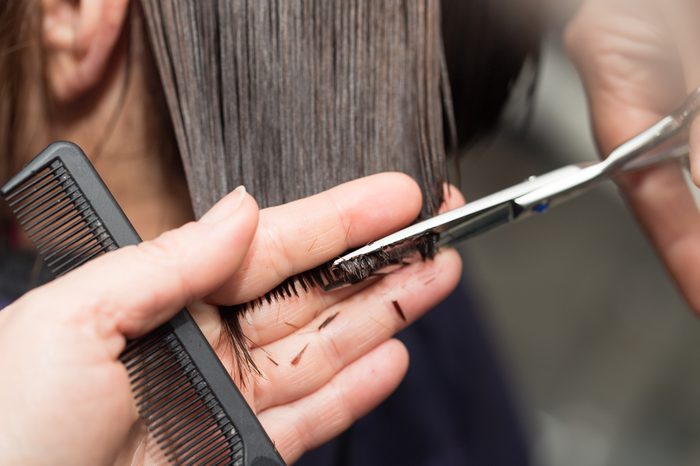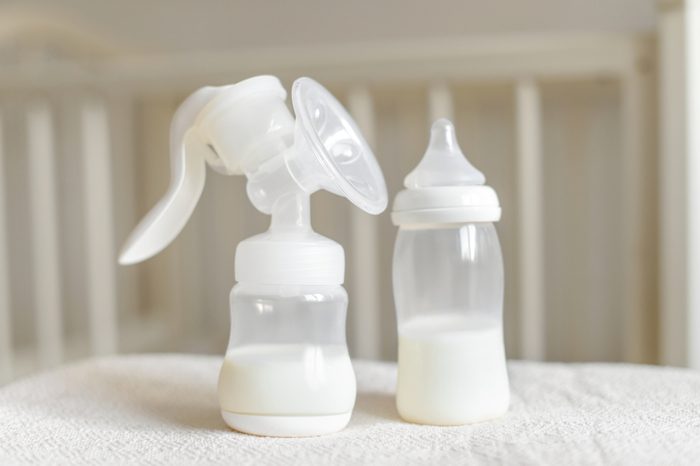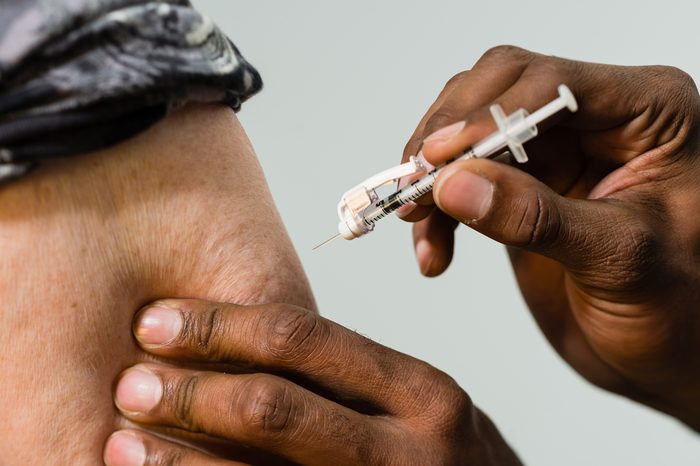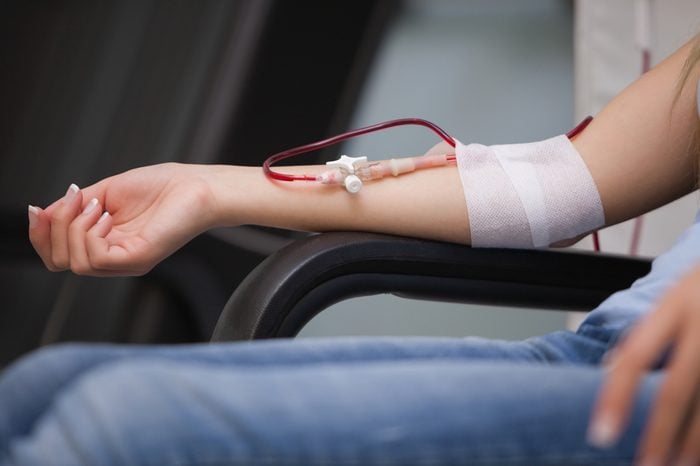
Selling your body legally
Aside from getting a second job, there are plenty of ways to make extra money. Selling your body for scientific or medical purposes is a legitimate way to earn cash. Despite advances in medicine, doctors and scientists still rely on donors for certain biological materials such as plasma, sperm, and eggs. These can be sold for a profit—legally—and you get the satisfaction of helping others. Some of these ideas can bring in extra money quickly; others require a lengthy time commitment. Check out seven ways you can legally sell your body for money.

Hair today, gone tomorrow
Going rate: Up to $1,500 or more
Artisans, beauticians, and wig makers are happy to buy your lengthy tresses for a pretty penny, says Marlys Fladeland, founder of the Victorian Hairwork Society, which buys long tresses and uses them to craft jewelry, purses and other objects.
“The hair that is most qualified for the highest price would be hair in good condition, very long, and straight,” says Fladeland, adding that “virgin hair” that has never been dyed is the most attractive to buyers. “Anything under 10 inches, I wouldn’t even post online. I think the best-selling hair is at least 15 to 35 inches, and some have been sold at 54 inches.”
Color counts, too. Gray hair may not sell at all, but natural blonds and brunettes with natural chestnut tinges sell well, with redheads financially faring the best, Fladeland says. Though hair prices can reach into the thousands, many sellers get only a few hundred dollars. You can also hawk your luscious locks through sites such as HairSellon.com, BuyandSellHair.com or Craigslist. Selling your hair too much of a leap? You can make your money work for you by opening a high yield savings account and taking advantage of up to 1.75 percent APY.

Donate egg-ceptional eggs
Going rate: $8,000, on average
“A donor is not being paid for eggs,” says Nazca Fontes, CEO of ConceiveAbilities, an egg donation and surrogacy agency based in Chicago. “She’s being paid for her time and her energy, and her eggs are a result.”
Donors can range from 21 to 35 years old, though ConceiveAbilities limits the age to 29. They must be in good health. Those who smoke, use drugs, have a high body mass index, or have mental health issues aren’t eligible.
According to New York State’s Department of Health, donors must pass initial eligibility screenings, take fertility drugs, check in for regular medical evaluations, and undergo a minor surgical procedure to have the eggs extracted. ConceiveAbilities donors can spend 25 to 100 hours undergoing medical treatments throughout the process, on top of at-home recovery time, Fontes says.
Dr. Mitchell Rosen, fertility expert at the University of California San Francisco Center for Reproductive Health, says there are risks for egg donors, such as ovarian hyper-stimulation syndrome, complications which can cause patients “discomfort where they can’t eat; there could be kidney failure and they potentially need to be hospitalized.”
You don’t have to sell your eggs to afford a kitchen remodel. You can easily find and compare personal loan rates without impacting your credit score. You can also try these 10 easy ways to make money fast.

Womb and board
Going rate: Around $35,000 to $53,000
Gestational surrogates carry the sperm and egg from a couple until the child is born. Because the surrogacy process usually lasts 15 to 18 months from initial application through birth, ConceiveAbilities’ screening process is much lengthier and includes medical and psychological evaluations, along with a criminal background check, home visit, and information on the applicant’s financial status.
Surrogates can be older than egg donors—early 20s to early 40s is the industry range, Fontes says—and many clinics require applicants to have experienced at least one uncomplicated pregnancy. In addition to adhering to strict medical requirements while carrying, surrogates sign a gestational surrogacy contract with the intended parents and may need to follow additional requirements on diet and lifestyle.
They must be clear on the terms of the arrangement. Since health care costs associated with the procedure can be high and complications are common, surrogates should read the fine print of their contract carefully and be absolutely sure of what’s required before signing.

Earn bucks for breast milk
Going rate: $2.50 per ounce, on average
You can legally sell your own breast milk, but Sarah Keim, a principal investigator for Nationwide Children’s Hospital in Columbus, Ohio, begs you not to.
For a study published in October 2013, Keim’s team bought more than 100 samples from an online vendor and found that nearly 3 out of 4 were contaminated with either abnormally high levels of bacteria or with bacteria linked to disease. “I imagine people are generally well-intentioned and do want to be compensated for their time and effort; however, there isn’t really a good way for people to ensure that even their own milk is safe and clean,” Keim says. She continues that if someone has excess breast milk ad is concerned about it going to waste, “there are other alternatives, like donating to one of the nonprofit milk banks.”
Milk banks screen donors and donations, Keim says. “That way, you can know that your milk is processed and made available to a baby that needs it.”
Put those profits toward a down payment on your next home and take advantage of historically low mortgage rates. Make sure you know these 26 secrets rich people won’t tell you about how they make money.

Participate in a clinical trial
Going rate: Up to $6,500 per project
Clinical trials use healthy people, as well as those suffering from specific conditions, to test new drugs and therapies. Clinical trials are conducted by drug companies, medical facilities, and the U.S. government. Compensation varies, depending on the length of the study and other factors.
It’s possible to make money by participating in clinical trials, but there may be risks, warns Arthur Caplan, a bioethicist at New York University’s Langone Medical Center. “Most clinical trials that are going to pay you are going to be studies early on in the development of the drug or vaccine. There won’t be much safety information, except from animals,” he says. “Those risks are something you have to ask about, take very seriously, and to some extent, you’re in the unknown.”
Testing facilities are required to inform participants about any known risks, but Caplan advises participants to also ask about what the animal trials of the treatment show. “You need to also know if something goes wrong, who’s going to pay for (your) medical care?” he says, adding that health insurance rarely covers effects of clinical trials. “If there is a side effect or problem, who is paying for that?” Don’t miss these money-saving tips from self-made millionaires.

Donate sperm
Going rate: Up to $1,500 per month
Most sperm banks require donors to be between 18 and 39 years old, according to the Mayo Clinic, but donating is not a one-time affair. Many clinics require donors to commit to making deposits at least once a week for six months to a year. Some facilities require deposits two to three times per week.
There are also genetic requirements for donors. Some facilities require donors to meet certain height requirements—usually 5 feet 10 inches or taller—and smokers, drug users, and those with genetic histories of certain diseases aren’t eligible.
Caplan says there are no physical risks to donating sperm, but donors who want to stay anonymous may face problems. “There is always a risk that if you (donate sperm), you’re going to have children that may be created that would find out or seek you out or learn your identity despite promises of confidentiality,” he says.
Planning on spending that extra $1,500 per month? Maximize your purchases with some of the best cash-back cards and get 5 percent cash back on all your purchases.

Donate blood and plasma
Going rate: $25 to $60 per donation
If you’re getting paid to donate blood, your donation may not be used the way you think. The federal government prohibits the use of blood collected from paid donors for transfusions in hospitals. According to the nonprofit blood center Blood Assurance, material gathered from paid donors is often used by pharmaceutical and cosmetics companies.
Risks for donating blood are extremely low, and donors may be able to contribute twice per week. A list of more than 600 licensed plasma donation centers throughout the U.S. and Europe is available at DonatingPlasma.org. If you’re not into any of these options, here are 50 more weird ways you can make $50.
Get expert advice and tools to help you make better financial decision. Sign up for the Bankrate newsletter today.